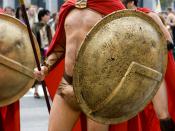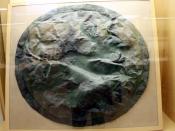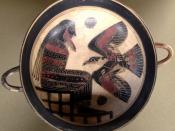Land Ownership
Because Spartiates were full time soldiers every Spartan equal was given a cleros (or kleros), along with slaves to work it. The land for used these cleroi was usually the newly conquered and very fertile Messenian land. The native inhabitants of Messenia were made into the Spartans slaves. They were called the Helots. Spartiates no longer had to worry about money, this economic independence freed the Spartiates to concentrate all their time and energies on training and fighting. Although it is uncertain how big cleroi were, it is certain that they were not all the same size. A Spartiate could not sell, divide or lose this land, it was passed on to male heirs. If a Spartan had no sons, the cleros was given to the daughter. Interestingly, women came to own some 40% of all Spartan land. Though they were not able to vote, the economic power of Spartan women was enormous.
Historians are not sure at exactly what age a spartiate was given his allotment of land, although Plutarch says that a Spartan was given his allotment when he proved that he would be "well built and sturdy".
Helots farmed the Cleroi, their main task was to provide enough food for their Spartan master's family to live on, and to provide food for the homoioi to contribute to the syssitia. If there was still excess food, a helot was sometimes given it to use how he liked. It was most often sold. Helots with "kind" masters could make a decent profit.
Despite the word :homoioi" meaning the equals, the sizes of the allotments given to the homoioi were far from equal. The size of a Spartan citizen's allotment could depend on their social status or the amount of land that they owned privately. Land that a...


